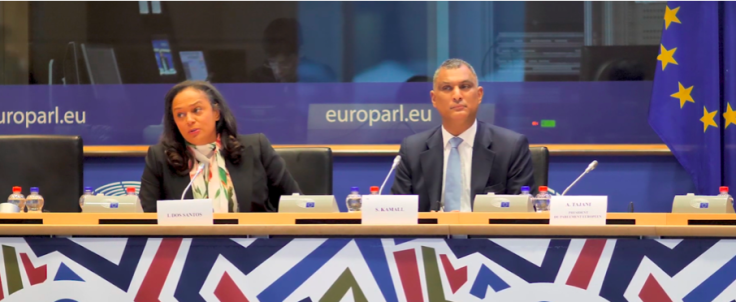Isabel Dos Santos Tackles Macroeconomic Issues in Africa

Angolan entrepreneur and business mogul, Isabel Dos Santos is pushing hard for a digital revolution in Africa. The pace of change in developing countries is gaining momentum, thanks to concerted efforts by African leaders like Dos Santos advocating for capital injections across the continent.
Among the many challenges faced by business owners in African countries are poor telecommunications infrastructures, substandard transportation networks, and lack of investment. At a recent economic symposium, Isabel Dos Santos impressed upon delegates the need to digitise telecommunications networks across the continent.
Beyond the technological aspect of developing the economy, she routinely touts the lack of egalitarian frameworks as the biggest stumbling block to prosperity. Females are often sidelined in favour of males, by dint of the fact that males are traditionally stronger and perceived as the breadwinners of families. These archaic beliefs have hampered economic growth in Angola, and across many patriarchal societies. But in her companies, Dos Santos actively advocates for the employment, empowerment, and promotion of women through the ranks. Her rise to the top was possible because she pushed her own education at Kings College in London, as an electrical engineer.
At the recent Africa-Russia panel of the St Petersburg International Economic Forum, Isabel Dos Santos highlighted several important challenges facing Angola specifically and African countries generally. The SPIEF 2019 conference presented African and Russian leaders with an opportunity to highlight challenges and offer workable solutions. At the conference, Isabel made the following statements:
Africa is actually a maze of different countries. So, you can’t think of us as a single destination, with a single set of issues or a single set of problems. You really have to think that we are very, very different countries; we have different legal systems, different administrative systems, different jurisdictions. So, working in Africa is not always easy unless indeed you realise there are these differences and you need to know where you’re going and what you want to do. To be pragmatic, what can we do? Well, I think some of the key issues have been talked about. So, we talked about education, we talked about energy, infrastructure, and of course there is always the business side and the business link.
I heard the numbers that you said. Well, you know, you need to get people to read and write. I like to think that we need to be more ambitious than that. I mean reading and writing is great, but we need more than that. We need people, young people, with the right set of skills. We need people who can get a job once they leave school and that job has to be relevant. So, the partnership between schools or universities and employment, businesses, has to be there from the onset. So, when you talk about Africa saying: Let's get people to read and write, I’d like to think: ‘No. Let’s get people jobs! And to do that, what kind of training, what kind of skills, what kind of schools do we need to create, to get those people those jobs?’
Standing Tall for African Aspirations
As the chairperson of UNITEL, Isabel Dos Santos was the only woman at the St Petersburg International Economic Forum. During the conference, Nikita Gusakov the chief executive officer of EXIAR (a Russian export insurance company) stated that Russian exports to Africa could top $1 billion in 2019. In 2018, the company secured contracts worth $0.5 billion, with significant development taking place in multiple sectors, including food security, pipeline infrastructure development, and fertiliser suppliers.
As part of the international delegation, Dos Santos and other African delegates extolled the virtues of African business enterprise and the opportunities that abound on the continent. The resource-rich countries of Africa present investors with opportunities to develop local economies and international trade, with human ingenuity and vast supplies of crude oil, gold, copper, cobalt, manganese, coal, and agricultural production. Over the years, significant economic ties have developed between Russia and various African countries including Zimbabwe, Cameroon, Sedan, Ethiopia, and Angola.
The adviser to the President of the Russian Federation, Anton Kobyakov said, "I strongly believe that Russian-African Corporation at SPIEF 2019, Russia's largest forum will stimulate trade and economic ties, as well as investment activity." As it stands, Russia has invested a total of $17 billion in Africa, with the bulk of investment activity conducted by China $120 billion, and India at $80 billion.





















